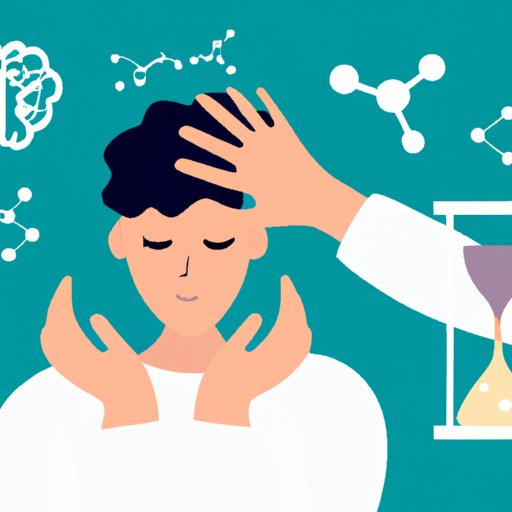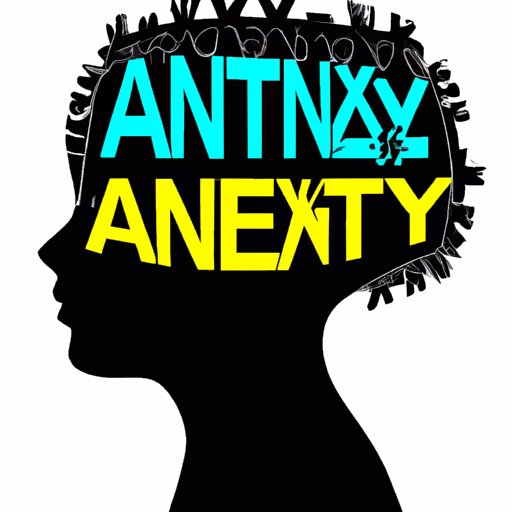
I. Introduction
Anxiety is a common emotional response to stressful situations, such as exams, job interviews, or public speaking. While occasional anxiety is a normal part of life, excessive anxiety can negatively impact daily life and mental health. This article aims to explore anxiety as a mental disorder, its causes, symptoms, and coping mechanisms.
II. Defining Anxiety as a Mental Disorder: Causes and Symptoms
Anxiety is a mental disorder that involves feelings of worry, fear, or unease. It is often accompanied by physical symptoms such as sweating, increased heartbeat, and trembling. Anxiety can be caused by various factors, including genetics, environmental factors, brain chemistry imbalances, and personality traits. Traumatic events, such as abuse or neglect, can also trigger anxiety disorders.
III. The Psychology Behind Anxiety: How it Impacts Mental Health
Individuals with anxiety disorders may experience various psychological implications, including panic attacks, phobias, and obsessive-compulsive behavior. Anxiety can negatively impact mental health by contributing to depression, relationship problems, addiction, and suicidal thoughts or behaviors. The emotional toll of anxiety can lead to decreased social and work productivity, memory problems, and compromised quality of life.
IV. Anxiety versus Normal Worrying: Understanding the Differences
Normal worrying is a natural response to stressful situations and is often resolved once the situation is resolved. However, excessive worrying can be a precursor to anxiety disorders, as it evokes the physiological and emotional response that is associated with anxiety disorders. Anxiety disorders are diagnosed when the worrying and physical symptoms become persistent and prevent the person from functioning in daily life.

V. How Anxiety Affects Daily Life and Coping Mechanisms to Manage it
Anxiety disorders can negatively impact daily life by contributing to avoidance behaviors such as social withdrawal or excessive use of drugs and alcohol. Anxiety can cause anticipatory anxiety, which is worrying about the possibility of having an anxiety attack in the future. It can also impact relationships by causing trust issues, communication problems, and resentment. Coping mechanisms for managing anxiety include mindfulness meditation, cognitive-behavioral therapy, and medication therapy. It is important to seek help from a mental health professional to identify the best coping mechanism for each individual.
VI. The Role of Genetics in the Development of Anxiety Disorders
Research has identified a genetic predisposition for anxiety disorders in some individuals. People with a family history of anxiety disorders may have a higher risk of developing anxiety disorders. However, not everyone with a genetic predisposition will develop anxiety disorders, and environmental factors may play a role in the manifestation of anxiety disorders.
VII. Common Misconceptions about Anxiety and its Treatment
Some common misconceptions about anxiety disorders include thinking it is a character flaw, believing that therapy is not effective, feeling ashamed of seeking help, and self-medicating with drugs or alcohol. However, these beliefs are not accurate. Therapy and medication can be effective in managing anxiety. Seeking help is a courageous step, and anxiety disorders are a manifestation of underlying factors that are beyond the control of the individual.
VIII. Exploring the Connection between Anxiety and other Mental Health Disorders
Anxiety disorders frequently co-occur with other mental health disorders, such as depression, substance abuse, personality disorders, and eating disorders. The presence of other mental health disorders can complicate the treatment of anxiety disorders, and it is important to address all co-occurring mental health disorders to improve the chances of recovery.
IX. Conclusion
Anxiety disorders can have a significant negative impact on an individual’s quality of life and mental health. With proper diagnosis and treatment, anxiety disorders can be managed. It is important for individuals experiencing symptoms of anxiety disorders to seek help from a mental health professional.
If you or someone you know is struggling with anxiety disorders, reach out to a licensed mental health provider for support and guidance.




